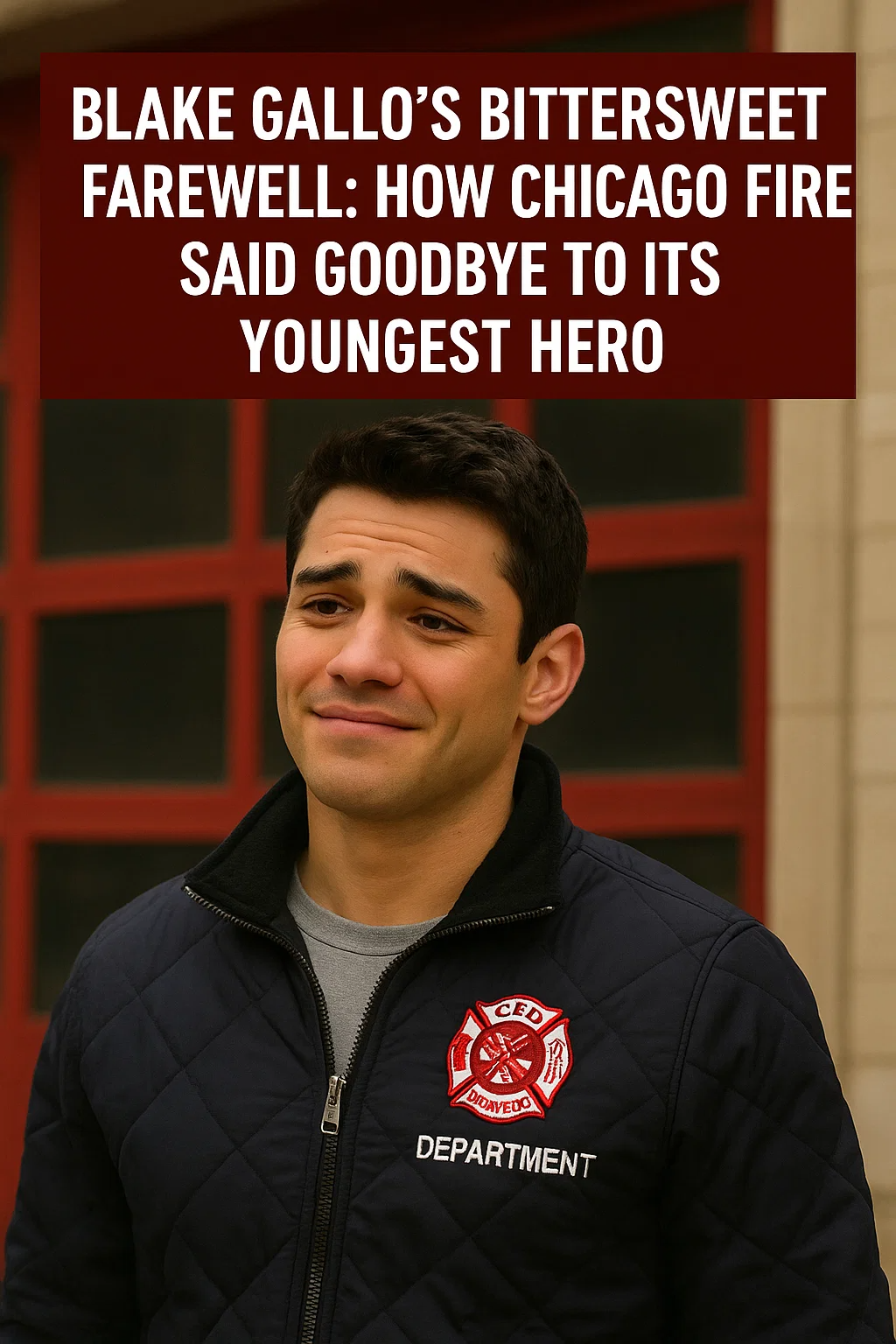
For more than a decade, Chicago Fire has thrived on intensity — explosive rescues, devastating emergencies, and shocking character exits that leave fans gutted. But every so often, the show trades spectacle for intimacy, proving that the quietest goodbyes can sometimes be the most heartbreaking.
Season 12 delivered exactly that when firefighter Blake Gallo (Alberto Rosende) said an emotional, unexpected farewell to Firehouse 51. After seven years in the show’s timeline, Gallo — once the wide-eyed rookie — walked away not because of tragedy or a line-of-duty death, but because of something more profoundly human: the chance to reconnect with long-lost family.
It wasn’t the ending fans expected. And perhaps that’s why it hit so hard.
From Rookie to Firehouse Heartbeat
Introduced as a replacement for the late Brian “Otis” Zvonecek, Gallo arrived with reckless energy and a fierce desire to prove himself. He was brash, impulsive, and sometimes downright reckless — the kind of rookie who would run headfirst into a blaze before thinking twice.
But underneath that bravado was a young man carrying immense grief. Having lost his family in a house fire, Gallo wasn’t just chasing adrenaline. He was searching for purpose, for belonging, for a new family to call his own.
At Firehouse 51, he found exactly that. Mentored by Kelly Severide, teased and challenged by Christopher Herrmann, and bonded tightly with fellow “next-gen” firefighters Darren Ritter and Violet Mikami, Gallo transformed from overeager rookie into a firefighter who could be counted on in the darkest moments. He wasn’t just the kid anymore; he was part of the backbone of 51.
That’s why his departure feels so abrupt. His arc wasn’t finished. And yet, life rarely waits for perfect timing.
The Final Episode: A Goodbye Without Flames
In a show that has staged some of the most jaw-dropping deaths and nail-biting rescues on TV, Gallo’s final episode took the opposite route. There were no explosions, no collapsing buildings, no heroic sacrifice. Instead, the focus was on something deceptively simple: a letter.
The letter came from a long-lost aunt in Michigan, one who had been estranged from Gallo’s late parents. She reached out, offering not just a visit, but the possibility of family — cousins, nieces, nephews, and the kind of kinship he thought he had lost forever.
At first, Gallo brushed it off as a curiosity. But by the end of the episode, he made a life-changing choice: to leave Chicago and build a new life surrounded by family ties he never thought possible.
The farewell scene was devastating in its restraint. No grand speeches. No drawn-out melodrama. Just Gallo, standing in the firehouse he called home, quietly telling his friends that he needed to go. His voice trembled between excitement and heartbreak, gratitude and grief. It was raw. It was real. And it left Firehouse 51 stunned into silence.
The Ripple Effect of His Exit
For the team, Gallo’s absence is more than just losing another firefighter — it’s losing a brother, a son, a friend.
-
Severide, who had guided Gallo through his reckless beginnings, will feel the weight of losing yet another protégé. Their bond had become one of respect and trust, making this goodbye feel like watching a son leave home.
-
Violet and Ritter, Gallo’s closest allies, are left gutted. The trio’s easy banter and fierce loyalty brought warmth to even the darkest storylines. Their final embrace is sure to be remembered as one of the most tear-jerking moments of the season.
-
Chief Boden, the firehouse patriarch, sees Gallo’s decision with bittersweet clarity. His parting words are filled with paternal pride, acknowledging not just the firefighter Gallo became, but the man he chose to be.
Unlike past exits, this wasn’t about death or danger. It was about life pulling someone in a different direction — a loss that feels both gentler and, in some ways, even harder to bear.

The Legacy of Blake Gallo
Gallo’s departure reshapes Chicago Fire in a way that feels deeply authentic. In a universe where tragedy so often defines endings, this quiet goodbye stands out. It reminds fans that not all heartbreak comes from catastrophe. Sometimes it comes from watching a loved one walk away to pursue their own happiness.
For fans, the door remains open. Because Gallo didn’t die, there’s always hope for a return — maybe a cameo, maybe even a long-term comeback down the line. Until then, his legacy endures in the family he built at Firehouse 51 and the inspiration he gave viewers who saw themselves in his resilience.
After seven years, Blake Gallo leaves not with sirens blaring, but with a whisper of what could have been. And in the world of Chicago Fire, that makes his exit all the more unforgettable.
